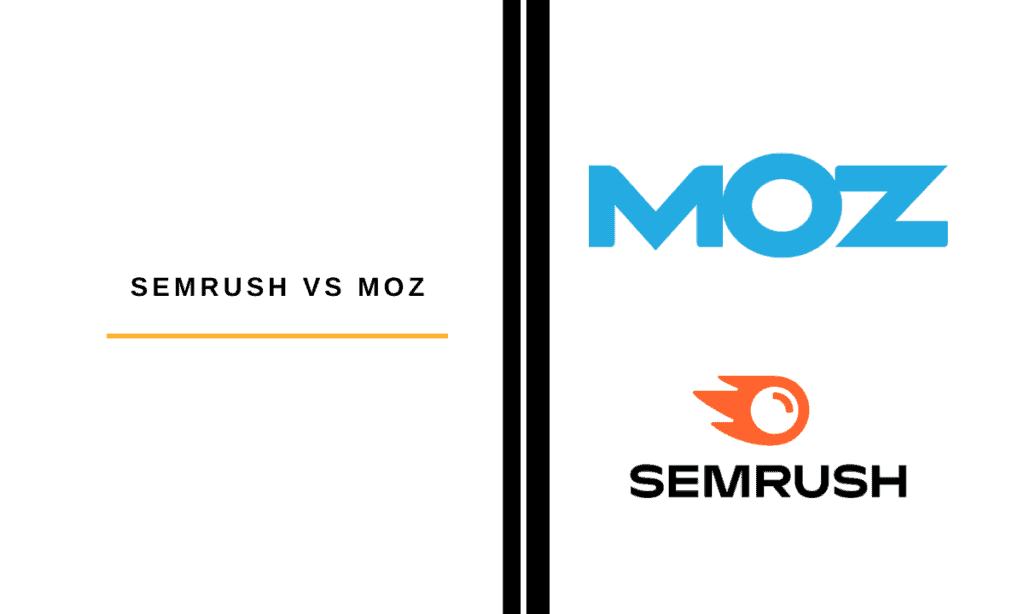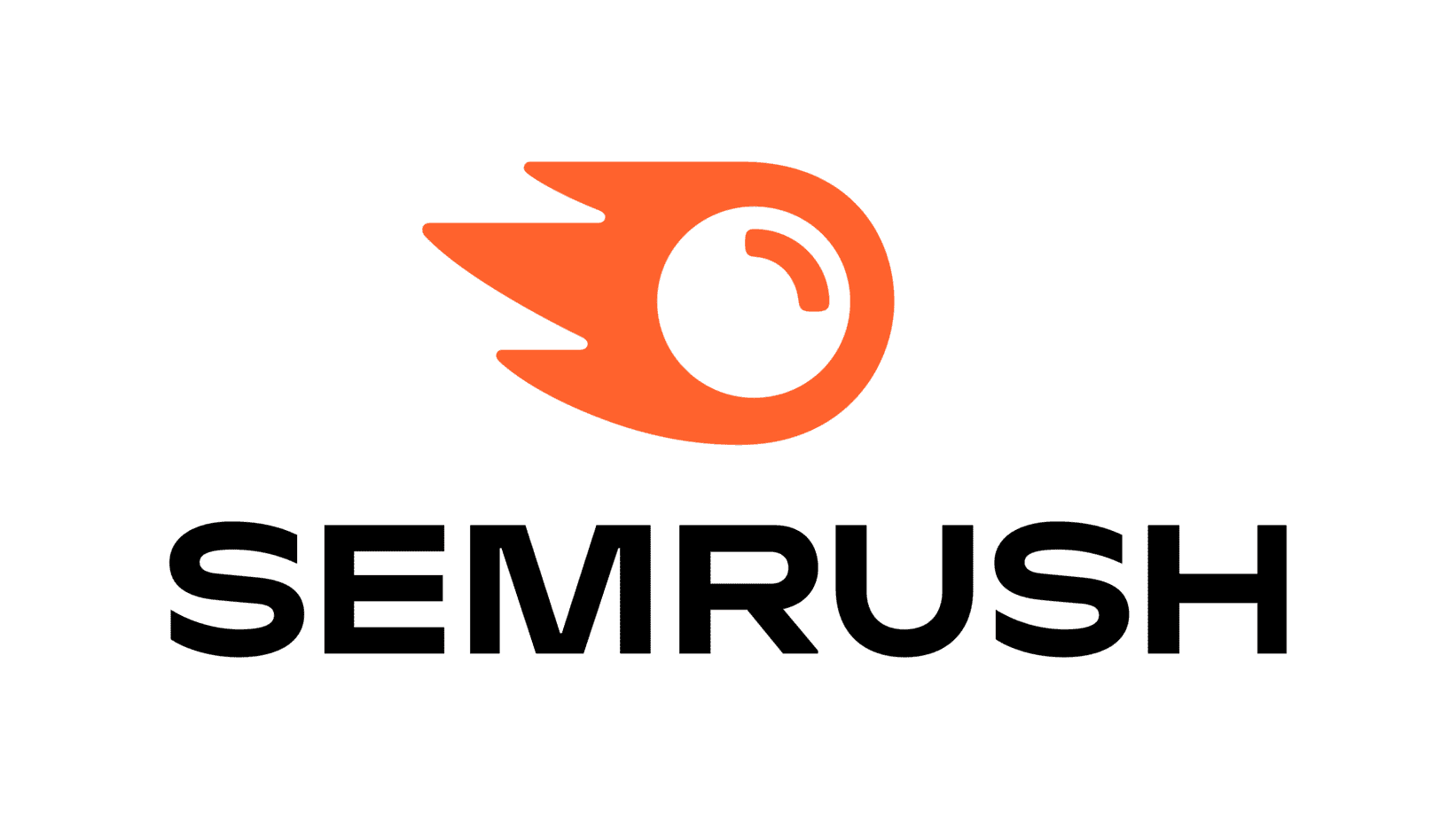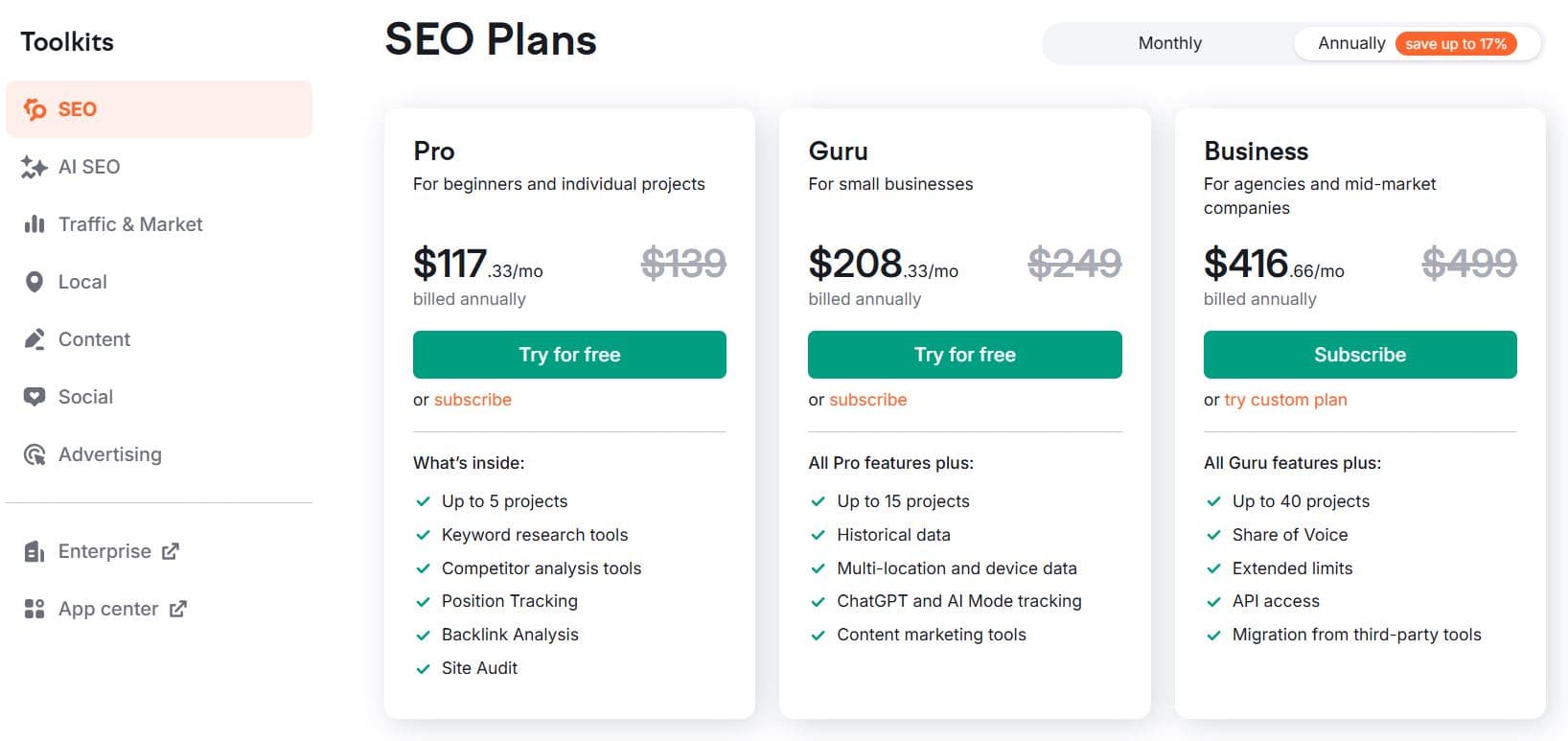- A Quick Take: Semrush vs Moz
- Feature-by-Feature Comparison: Semrush vs Moz
- Keyword Research & Data Accuracy
- Site Audits & Technical SEO
- Backlink Analysis & Link Building Tools
- Rank Tracking & SERP Feature Monitoring
- Competitive Analysis
- Local SEO Tools
- Pricing & Value
- Should You Choose Moz or Semrush? (All About Use Cases)
- My Final Verdict: Is Semrush or Moz the Best?
Last Updated on August 27, 2025 by Ewen Finser
Moz and Semrush are probably the Coke and Pepsi of search marketing. Some of you might say it’s Ahrefs, but that’s my opinion. They’ve both been around like forever, both are industry giants, both have a loyal fan base. And each insists they’re the better all-in-one platform.
In 2025, the rivalry feels more evident than ever. Especially because Google’s SERPs have been flipped on their head with AI Overviews (SGE), more zero-click results, and enough algorithm updates to keep SEOs living on caffeine. That means the tools we choose have to do more than just spit out keywords and backlinks; they need to help us predict, adapt, and pivot before the next shake-up.
I’ve used both platforms over the years, sometimes side by side in the same campaigns, and this updated comparison digs into what’s changed, what’s worth your money, and which one should be your SEO wingman for 2025.
I use a LOT of tools. Probably more than I need to. There are a few that are truly indispensable. I have a Semrush tab open EVERY day as I work. Keyword searches, technical audits, competitor analysis? It does it all. Try it out for free.
A Quick Take: Semrush vs Moz
If you just want the “tell me who wins where” version, here’s the cheat sheet.
Feature | ||
Best for | All-in-one digital marketing: SEO, PPC, content, social, and competitive intel | Pure SEO focus at a friendlier price point |
Keyword data | Massive organic and PPC keyword database, complete with intent labels | Large organic keyword set, solid for global searches but no PPC data |
Backlink index | Huge and frequently updated; great for deep link audits | Reliable, but smaller and updated less often |
Site audits | Full technical and on-page audits, Core Web Vitals checks, and AI suggestions | Strong site crawl with clear, beginner-friendly recommendations |
Competitive analysis | Market Explorer, Keyword Gap, Traffic Analytics, so plenty of ways to spy (ethically) on rivals | True Competitor tool and keyword gap analysis for SEO-focused insights |
Rank tracking | Daily updates, mobile, and local splits, and full SERP feature monitoring | Weekly updates, fewer SERP feature tracking options |
Local SEO | Listing Management with review monitoring and analytics | Moz Local for easy, affordable citation and listing management |
Free tools | Website Authority Checker, Keyword Rank Checker, SERP Checker, Keyword Search Volume Checker, Google SERP Simulator, and more | Domain Authority Checker, Link Explorer, Keyword Explorer, Competitive Research, Brand Authority Checker, and more |
Learning resources | Semrush Academy, webinars, blog, and Knowledge Base | Moz Blog, Beginner’s Guide to SEO, SEO Learning Center, and Moz Academy |
Free trial | 7-day trial on the toolkits, with a 14-day trial for some add-ons | 7-day trial |
Pricing | Dependent on the toolkit and seats, but starts at $20/mo for the Social Plans, $30/mo for the Local Plans, $60/mo for the Content Plans, $99/mo for the AI Plans, and $139.95/mo for the SEO Plans | $49/mo for the Starter plan on Moz Pro and $20/mo for the Lite plan on Moz Local |
Feature-by-Feature Comparison: Semrush vs Moz
I ran Semrush and Moz through everyday SEO and marketing tasks to see where each shines, where they stumble, and which one’s more likely to earn (or lose) a spot in your 2025 toolkit.
Keyword Research & Data Accuracy
Which platform gives you the most useful keyword data? That depends on how you work.
The gist: Semrush is the all-rounder for SEO and PPC campaigns, while Moz is better for straightforward, organic-focused keyword targeting.
Semrush
Semrush takes a “big-picture” approach to keyword research. Instead of just listing high-volume terms, it adds layers of context with keyword intent, SERP layout, historical trends, and even PPC competition. This makes it especially strong if you’re running integrated campaigns where SEO and paid search work hand-in-hand.
The Keyword Magic Tool is still the centerpiece, but the Keyword Gap and Topic Research tools are just as valuable. In testing, I found Semrush surfaced double the long-tail opportunities that Moz did for the same seed keyword, and the SERP feature tracking made it easier to spot where I could steal visibility from competitors.
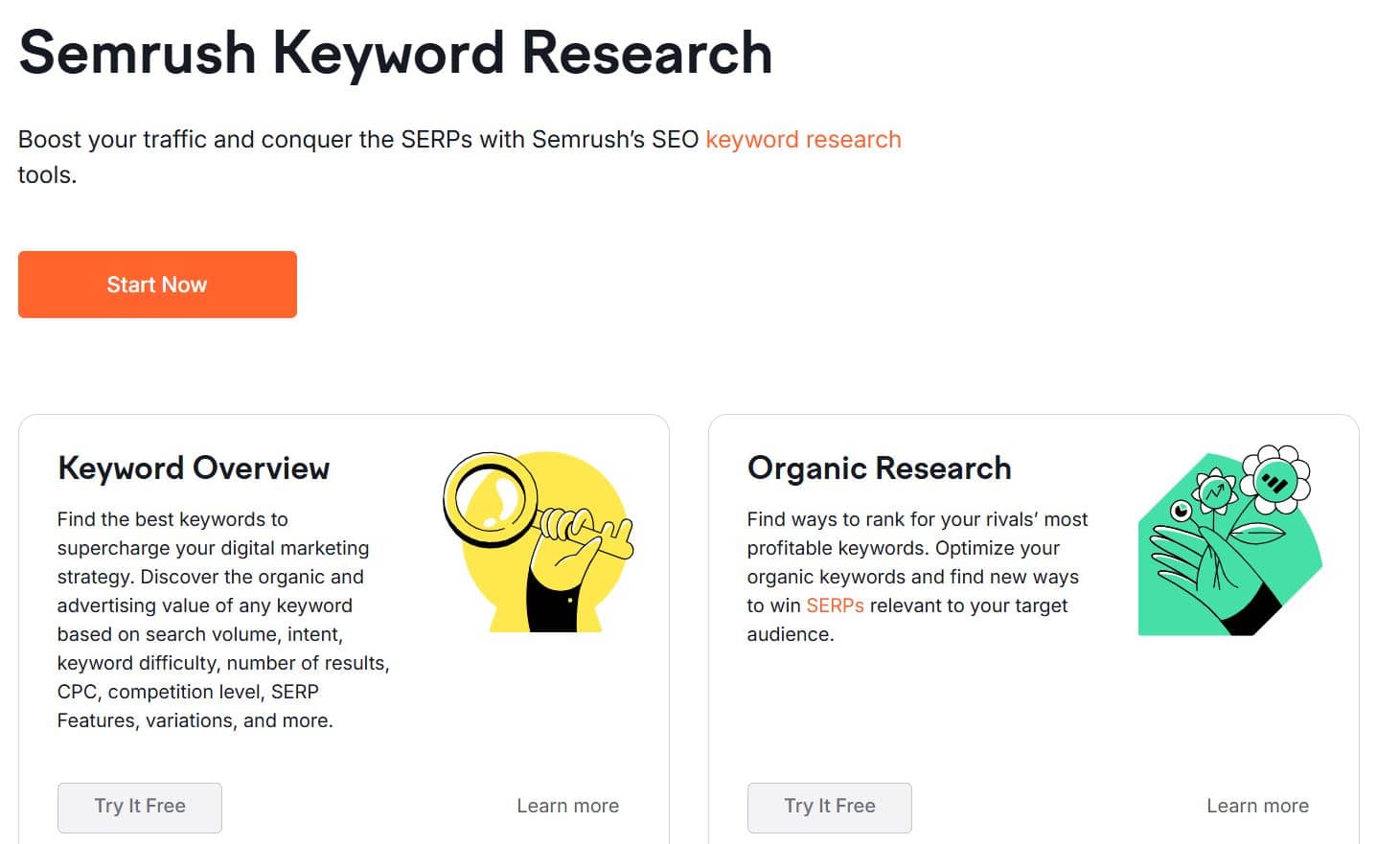
Key features:
- Combines organic and PPC keyword data
- Google Ads and Product Listing Ads (Shopping) insights
- Keyword intent labeling (informational, navigational, etc.)
- Tracks SERP features, clusters, and historical volume trends
- Integrates with Google Search Console for real-time validation
Moz
Moz keeps things simpler with Keyword Explorer, and that’s not necessarily a bad thing. If you want a clean, intuitive interface without an overload of filters, it’s great. The “Priority” score, which blends volume, difficulty, and CTR, helps you quickly spot the most viable targets without juggling separate metrics.
The downside is scale. Moz’s keyword database is smaller than Semrush’s, so if you’re working in niche markets or outside the US, you might run into gaps. Still, for pure organic SEO, especially if you don’t need PPC data, it’s reliable and beginner-friendly.
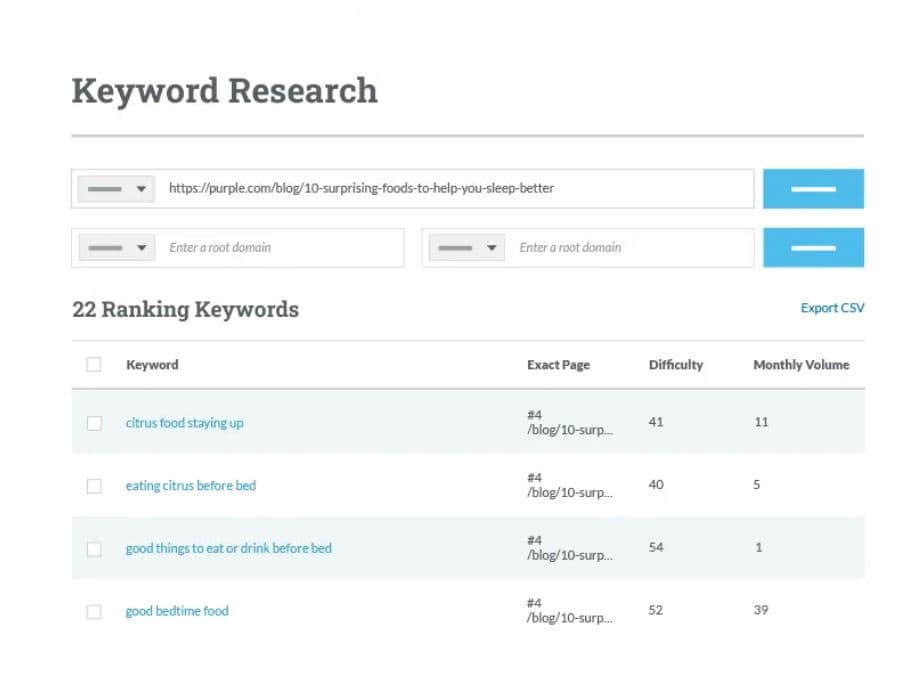
Key features:
- Keyword Priority score for quick decision-making
- Organic CTR and keyword difficulty estimates
- Suggested keyword groupings for topical relevance
- Clean, uncluttered UI for fast research
- Good balance of short-tail and long-tail terms (within dataset limits)
Site Audits & Technical SEO
Good technical SEO can be the difference between a page-one ranking and getting buried.
The gist: Semrush digs deeper into technical issues, while Moz focuses on accessibility and ease of fixes.
Semrush
Semrush’s Site Audit is one of the most thorough I’ve used. It covers everything from HTTPS errors to hreflang tags, Core Web Vitals, and JavaScript rendering. The AI-powered recommendations have improved in 2025, making it easier to triage and fix issues without pulling in a developer right away.
The ability to set crawl schedules, compare audits over time, and integrate with Trello or Asana means you can fold these insights directly into your workflow. For large sites with complex architecture, this is a huge win.

Key features:
- 140+ technical and SEO checks
- AI-powered fix suggestions
- Core Web Vitals and mobile usability reporting
- Crawl comparison to track improvements or regressions
- Integration with project management tools
Moz
Moz’s Site Crawl is less intimidating feature-wise, and that’s a plus for smaller teams. It flags common issues like missing meta descriptions, duplicate content, and redirect loops, and provides plain-language explanations for each problem.
While it won’t go as deep into JavaScript rendering or Core Web Vitals as Semrush, it’s faster to run and easier to interpret if you’re not a technical SEO specialist. The weekly crawl schedule on most plans is fine for small to medium sites, but daily tracking would be nice.
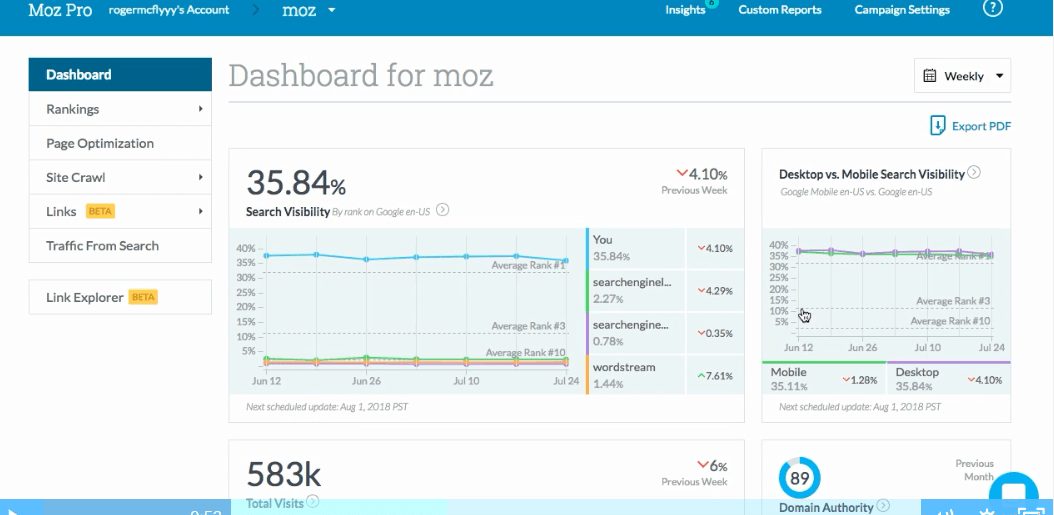
Key features:
- Clear, jargon-free issue explanations
- Prioritized issue lists with severity scores
- Duplicate content and redirect loop detection
- Weekly crawl scheduling (and on-demand crawls are plan-dependent)
- Exportable reports for client or team sharing
Backlink Analysis & Link Building Tools
Backlinks are still one of the top ranking factors, but quality beats quantity every time.
The gist: Semrush leads on database size and freshness, while Moz’s DA/PA metrics are still widely recognized.
Semrush
Semrush’s Backlink Analytics is built for scale. The index is updated frequently, and you can filter by link type, follow/nofollow, country, and more. Their toxic link detection is particularly useful if you’ve been targeted by spammy link-building campaigns.
Pair that with the Link Building Tool, which surfaces outreach targets and tracks progress, and you’ve got a built-in workflow for acquiring and managing links.
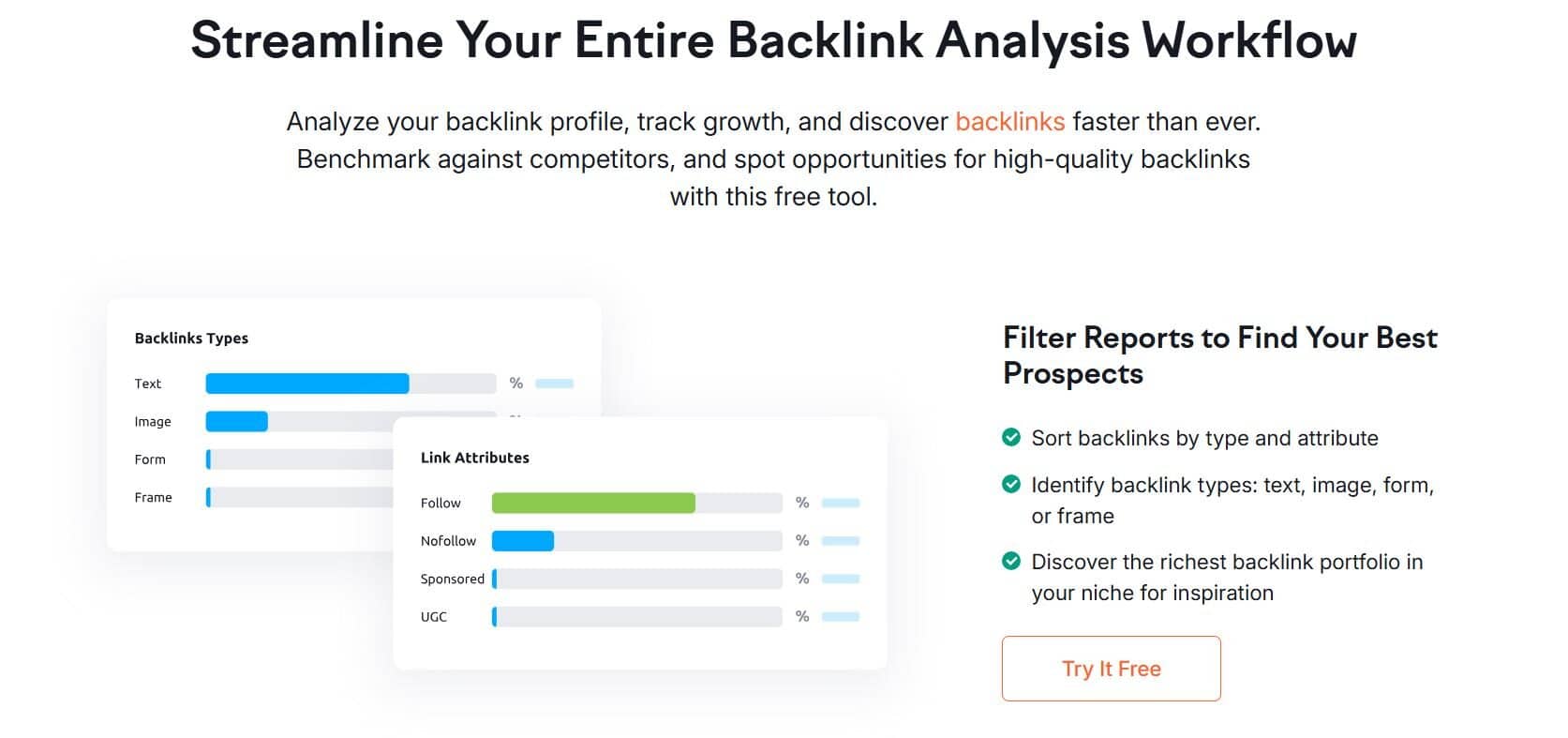
Key features:
- Massive, frequently updated backlink index
- Toxic link detection with disavow file export
- Filter by link type, anchor text, and referring domain metrics
- Integration with Link Building Tool for prospecting
- Historical backlink data for trend analysis
Moz
Moz’s Link Explorer is where Domain Authority (DA) and Page Authority (PA) shine. These metrics are still quoted in countless SEO reports and pitches, and they’re especially helpful for quick link quality checks. The Spam Score is a nice sanity check before pursuing a link.
Moz also offers a Link Intersect tool for spotting sites linking to competitors but not you, a straightforward way to find outreach opportunities. The drawback is a slightly smaller and less frequently updated index compared to Semrush.
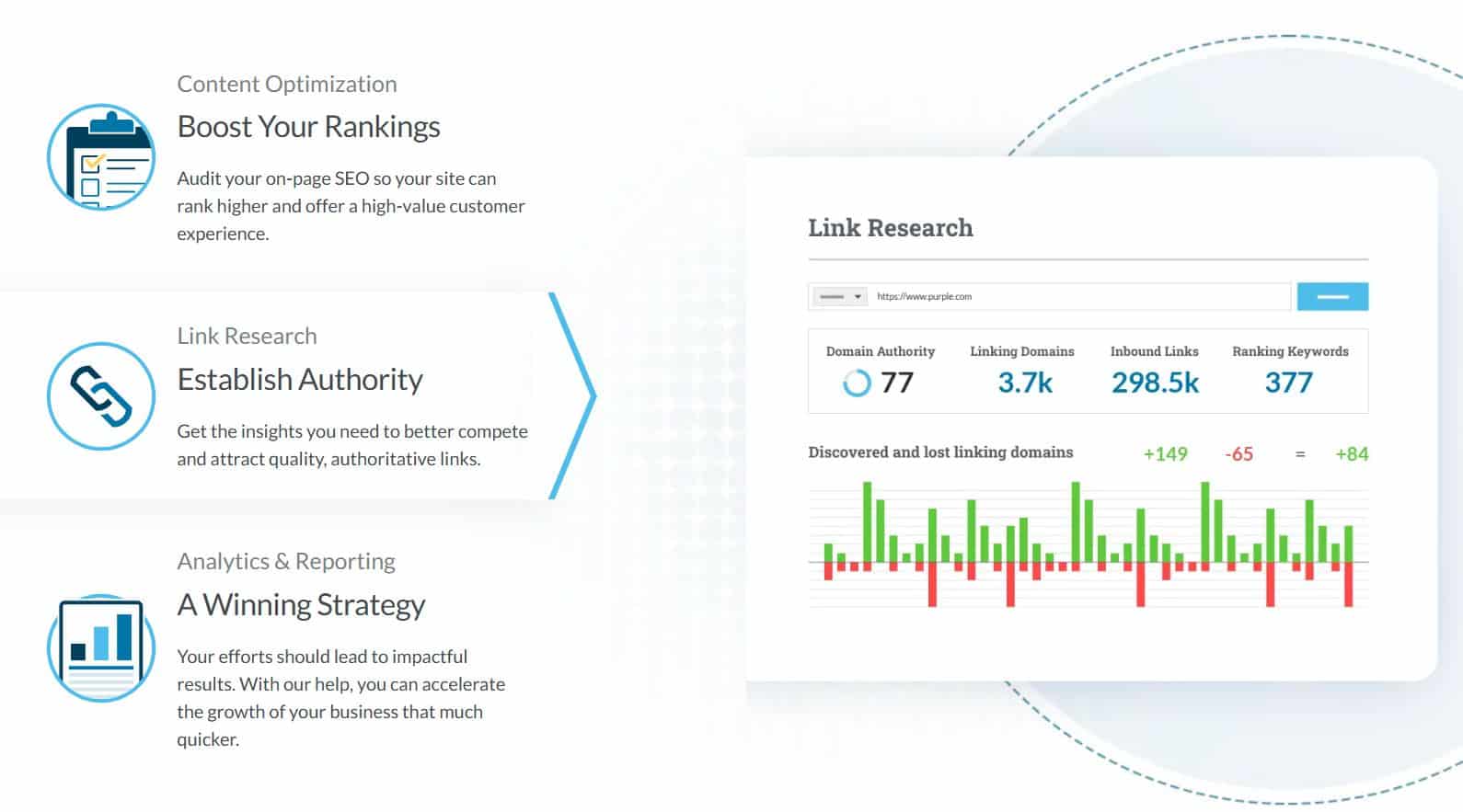
Key features:
- DA and PA scoring for quick quality assessment
- Spam Score to flag risky domains
- Link Intersect tool for competitor analysis
- Anchor text distribution reports
- Clean, intuitive interface for link data
Rank Tracking & SERP Feature Monitoring
Rank tracking isn’t just about positions anymore; it’s about owning SERP features, too.
The gist: Semrush offers more frequent updates and granular tracking; Moz keeps it simple.
Semrush
With daily rank tracking, device/location filters, and SERP feature monitoring, Semrush makes it easy to see where you stand and where you could grab more SERP real estate. You can also track competitor rankings side-by-side, which is useful for quick-win targeting.
The Position Tracking tool integrates with GSC for extra data validation, and you can set alerts for significant ranking shifts, which is a lifesaver during volatile Google updates.
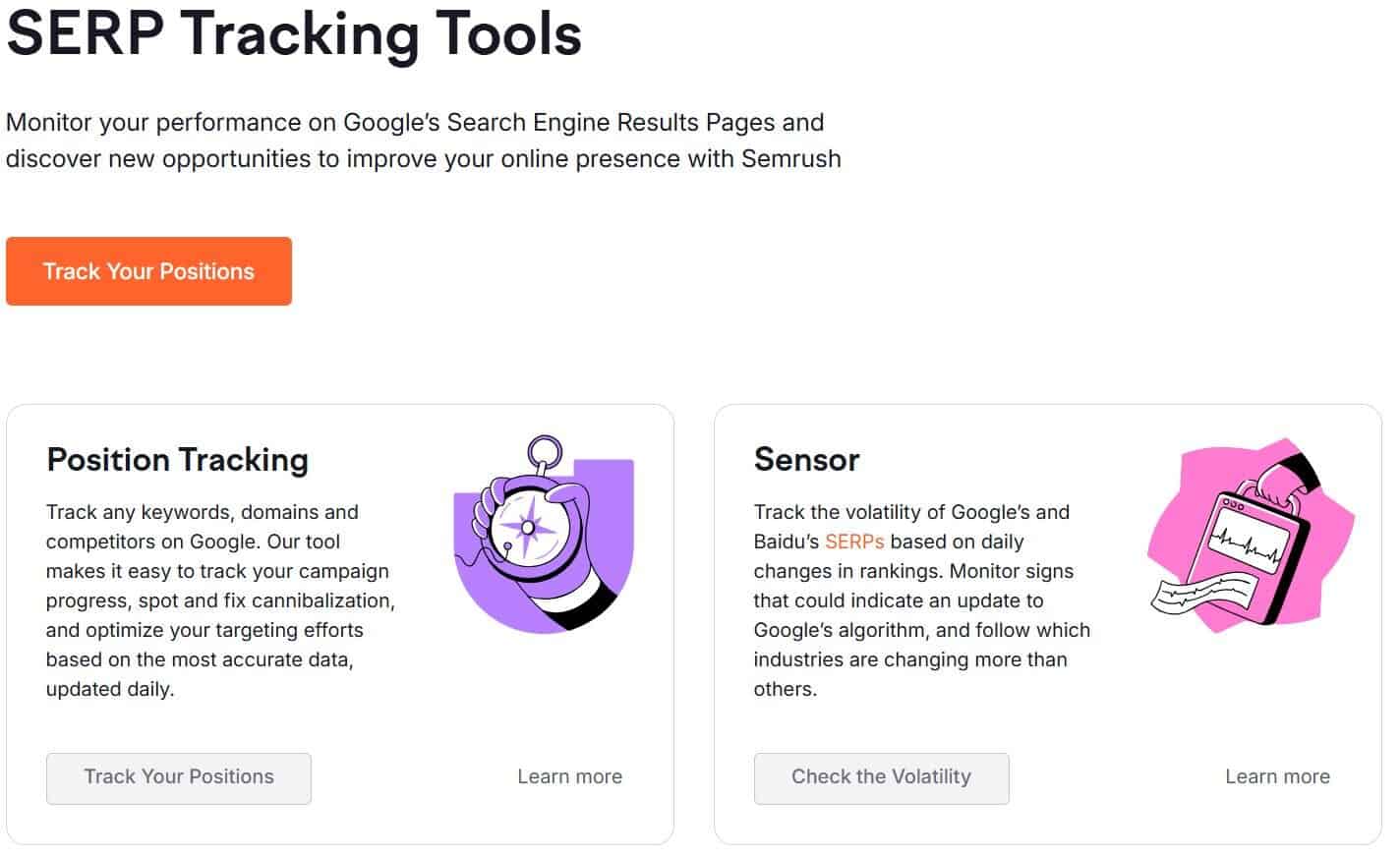
Key features:
- Daily rank updates (desktop and mobile)
- Local and global tracking options
- SERP feature ownership tracking
- Competitor ranking comparisons
- Alert system for ranking changes
Moz
Moz Pro includes weekly rank tracking for keywords across search engines. It’s accurate and integrates with Moz’s keyword research tools, making it easier for you to tie rankings back to strategy. The trade-off is less granularity.
There’s no daily tracking unless you upgrade and fewer SERP feature insights. Still, for smaller campaigns or less volatile niches, it’s more than enough.
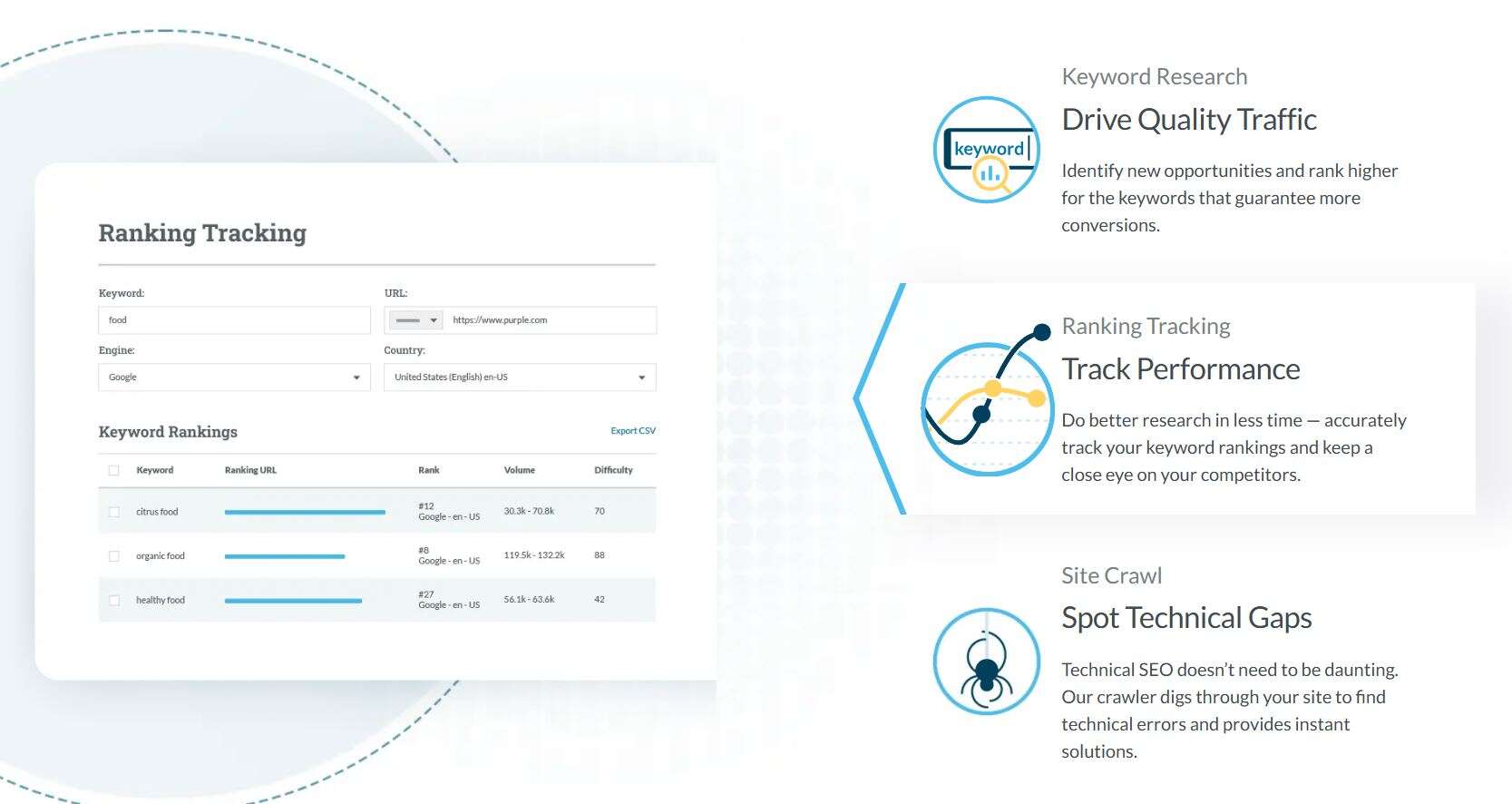
Key features:
- Weekly rank updates (desktop and mobile)
- Search engine and location-based tracking
- Simple trend charts for performance over time
- Integrated keyword research connection
- Low learning curve for new users
Competitive Analysis
Knowing what your competitors are doing can shape your entire strategy.
The gist: Semrush offers deeper, broader competitive intel, while Moz’s tools are quicker to grasp.
Semrush
Market Explorer and Organic Research are where Semrush shines for competitor analysis. You can see a competitor’s top keywords, traffic trends, and even estimated ad spend. The Keyword Gap and Backlink Gap tools make it easy to find where they’re outranking you and where you can catch up.
For content planning, Semrush also shows top-performing pages and traffic-driving keywords, making it easier to reverse-engineer winning strategies.
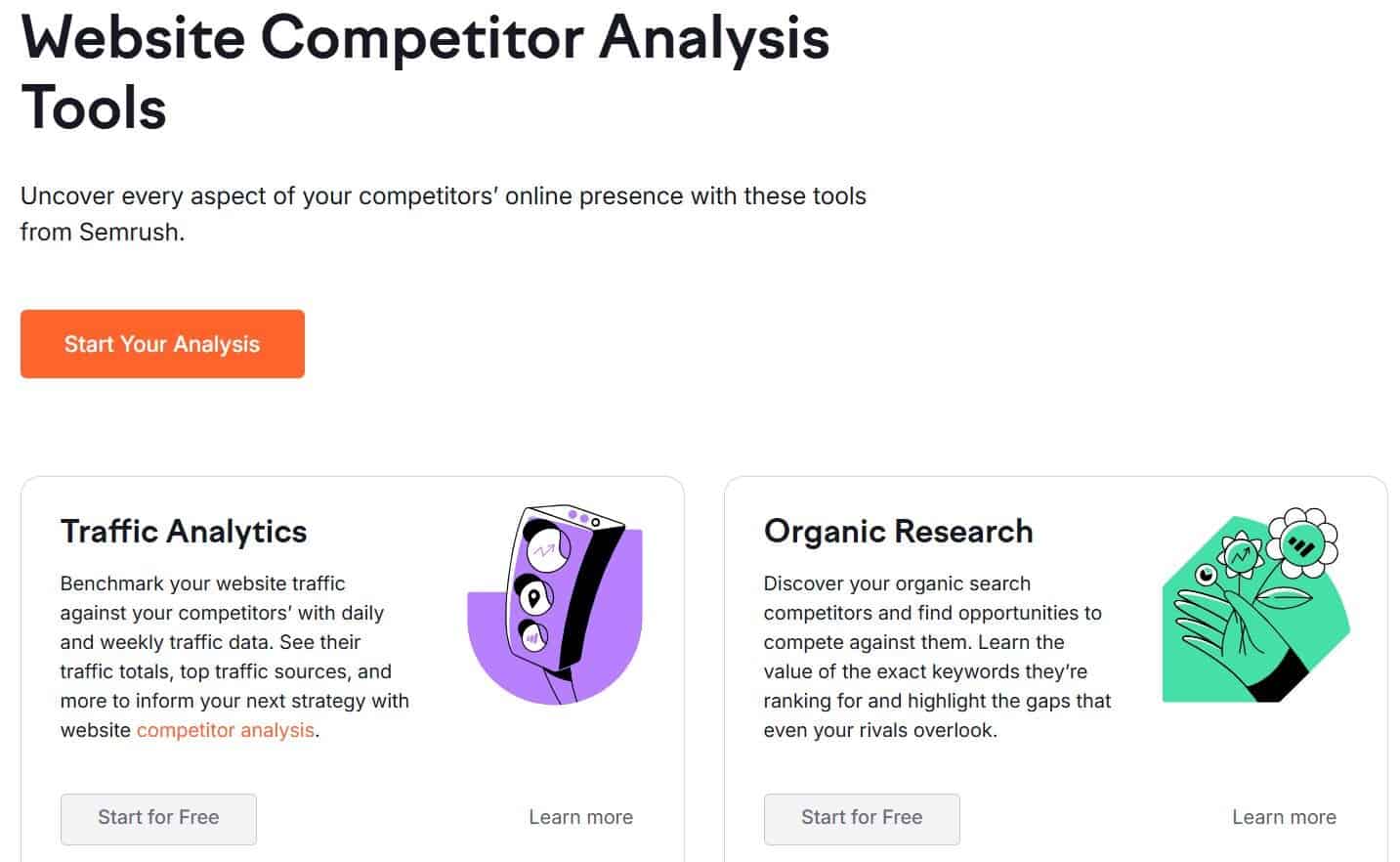
Key features:
- Competitor traffic analytics (organic & paid)
- Keyword and backlink gap tools
- Market share and niche trend analysis
- Top pages and content performance reports
- PPC visibility data alongside SEO metrics
Moz
Moz’s True Competitor tool simplifies the process of identifying your real organic competition, which are often sites you wouldn’t think to check. It shows keyword overlaps and relative visibility, helping you prioritize who to monitor.
While it lacks paid data and some detailed depth of Semrush, it’s faster to use if you’re focused on organic SEO.
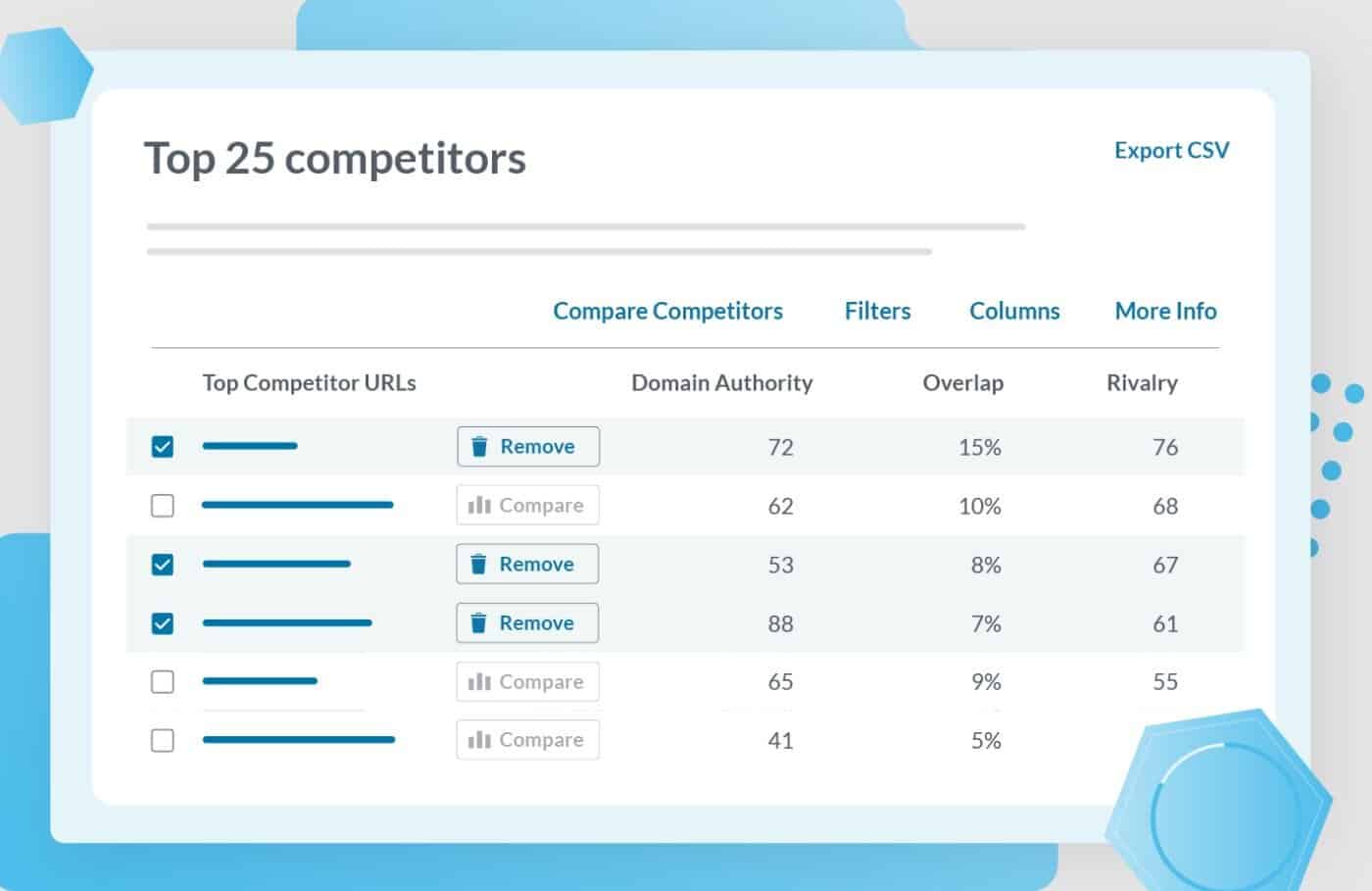
Key features:
- True Competitor keyword overlap analysis
- Organic visibility comparisons
- Easy-to-read competitor lists
- Integrated link data for competitor domains
- Minimal setup required
Local SEO Tools
Local presence can make or break small businesses.
The gist: Moz is better for dedicated local campaigns; Semrush is better if local is just one piece of the puzzle.
Semrush
Listing Management, powered by Yext, lets you distribute and update business info across major directories. You can also monitor reviews and track local rankings from the same dashboard. It’s convenient if you want everything under one roof.
The downside? Some features require add-on costs, and review management isn’t as robust as Moz’s.
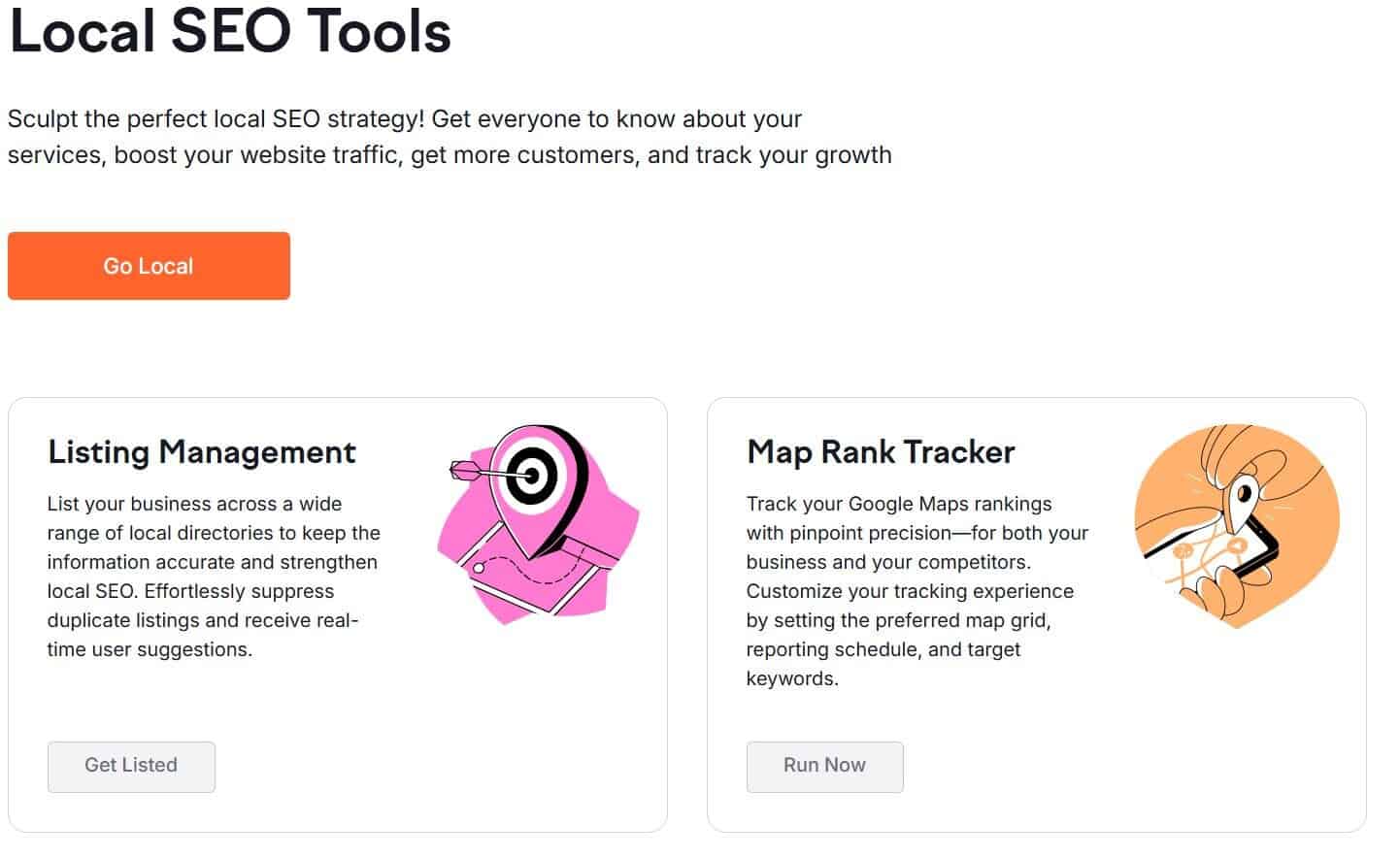
Key features:
- Directory listing distribution and updates
- Local rank tracking by ZIP code
- Review monitoring (basic)
- Integration with wider SEO toolkit
- Centralized dashboard for multi-location businesses
Moz
Moz Local is a stand-alone product, and it’s excellent at what it does: distributing accurate listings, suppressing duplicates, and giving you robust review monitoring tools. For small businesses without complex SEO needs, it’s a strong, affordable choice.
Key features:
- Automated listing distribution to top directories
- Duplicate listing suppression
- Detailed review monitoring and alerts
- Store locator and mapping options
- Simple pricing, separate from Moz Pro
Pricing & Value
If you’re comparing tools at this level, price isn’t everything, but it can make the difference between “worth it” and “ouch.” Here’s how Semrush and Moz stack up in 2025, plus what you actually get for your money.
The gist: Semrush is the best value for marketing teams and agencies running multi-channel campaigns, while Moz is ideal if you want affordable, SEO-focused tools without extras you won’t use.
Semrush
Semrush isn’t cheap, but you’re not just paying for SEO data. You’re getting an all-in-one platform that can replace multiple subscriptions for keyword research, site audits, PPC research, social media management, and content planning.
For agencies or in-house teams handling organic and paid campaigns, that consolidation can save money in the long run.
Pricing varies by toolkit, and each may have its own Base, Pro, Guru, and Business tiers:
- SEO plans start at $139.95 per month
- Traffic & Market plans start at $289 per month
- Local plans start at $30 per month
- Content plans start at $60 per month
- AI plans start at $99 per month per domain
- Social plans start at $20 per month
- Advertising plans start at $99 per month
- Enterprise plan has custom pricing
Beyond the core subscriptions, Semrush offers optional add-ons like additional users, extended reports, and lead generation.
Moz
Moz keeps things simpler and cheaper, especially at the entry level. If all you need is reliable SEO tools for keyword research, site audits, and link tracking, Moz Pro’s plans are straightforward and easier on the budget.
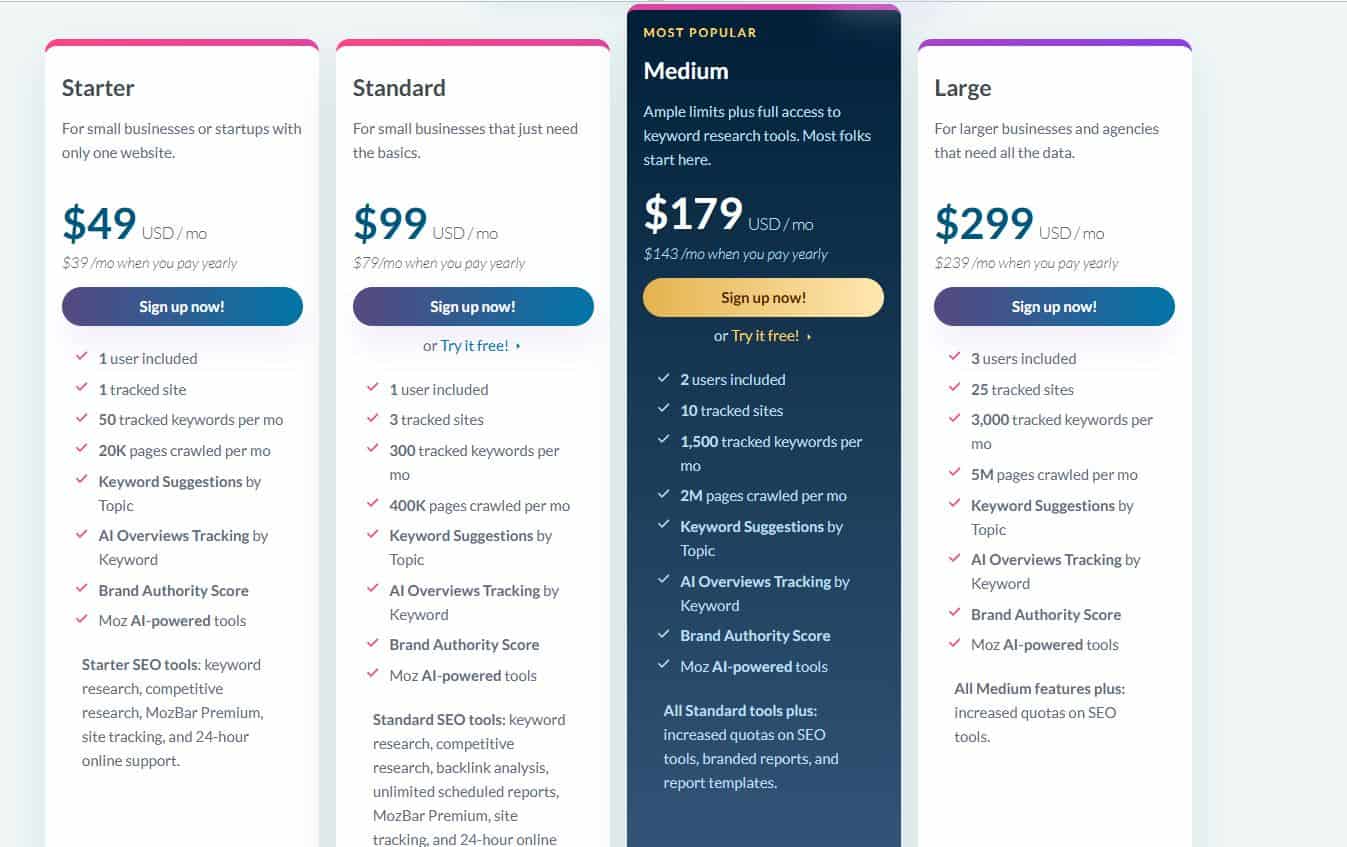
Their pricing tiers are:
- Starter: $49/month
- Standard: $99/month
- Medium: $179/month
- Large: $299/month
All plans include the core Moz Pro toolkit, with differences in keyword limits, tracked sites, and reporting frequency.
The Medium tier is the sweet spot for most small to mid-sized businesses, while Large is aimed at agencies or brands with heavy reporting needs. Annual plans save you 20%, while Semrush only offers a 17% discount for its SEO toolkit if you pay annually.
Should You Choose Moz or Semrush? (All About Use Cases)
Choosing between Moz and Semrush is about matching the tool to the way you work.
Semrush is like the Swiss Army knife of digital marketing: it’s got a blade for everything, from SEO and PPC to content and competitive research.
Moz, on the other hand, is the trusted chef’s knife. It’s sharper in one area, lighter in your hand, and perfect if you know you’re mostly slicing organic SEO data.
- Agencies & power users → Semrush, since you’ll get everything under one roof with SEO, PPC, social, content, and competitive intel.
- Small businesses focused on local SEO → Moz Local is simple, effective, and affordable.
- Content marketers → Semrush is the content marketing toolkit, and its topic research features make it easier to plan at scale.
- New SEOs or tight budgets → Moz has a cheaper entry point and gentler learning curve.
My Final Verdict: Is Semrush or Moz the Best?
If I had to crown a winner, Semrush still takes the overall lead in 2025. It’s the Swiss Army knife of SEO with its massive keyword database, deep competitive intel, and enough extras to replace half a dozen other tools.
That said, Moz isn’t playing in the wrong league. For businesses focused on local SEO or for marketers who want a clean, straightforward platform without getting lost in a sea of features, it’s still a smart, budget-friendly choice.
In the end, it’s less about who’s “best” and more about who’s best for you. Just make sure whichever you choose, you’re ready for the next SERP shake-up, because in 2025 and beyond, it’s not a question of if, but when
Semrush has generously offered our readers a double extended fully featured FREE TRIAL. Play around with the suite for 2 full weeks to see if it's what you need!
Here are some other related articles you may be interested in:
- 7 Best SEMrush Alternatives for Serious Marketers
- How to Find the Best SEO Tools for Digital Marketing
- SEMrush vs Majestic: Which Is the Ideal Keyword Search Tool for You?
- SEMrush vs Ahrefs Comparison
- SEMrush versus Raven Tools Compared
- SEMrush compared to SimilarWeb
- SEMrush vs SpyFu
- SEMrush vs SEO PowerSuite
- SEMrush vs LongTailPro
- SEMrush vs SE Ranking
- SEMrush vs SEO Profiler
- SEMrush vs Accuranker
- Raven Tools Competitors Worth Trying
- SE Ranking Review
- AccuRanker Review
- Serpstat Review

